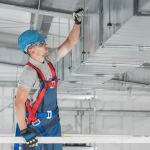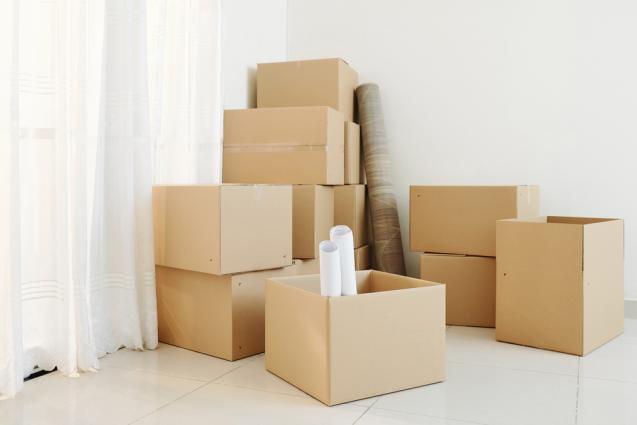
6 Essential Tips to Consider When Installing a HVAC
By Move My Stuff|June 15, 2022
Your new business premises should take into consideration a number of things.
There are a variety of things to consider, but one of the most significant considerations is the best installation practices for HVAC.
If you need an HVAC installation in a commercial building, you always have the option of contacting some of the top air conditioning providers.
This will fulfil your requirements. From installation to routine maintenance, it is always wise to rely on a reliable company for all your HVAC installation and maintenance needs.
In addition to alleviating your stress, the professionals will be able to save you time and effort by installing the HVAC in accordance with the standards.
Following are some necessary tips to keep in mind before installing a commercial air conditioning unit
1. Dimensions of the space:
The size of a commercial property must always be taken into account first. In commercial properties, the cooling and heating requirements are likely to be higher. The size of the unit must match the building's space in order to avoid energy wastage and short cycling. Reliable professionals will conduct load calculations to determine the number and size of units that are required for a given commercial building.
2. Cost:
Most people purchase the cheapest HVAC system to save money. Cost-effectiveness, however, is a function of the longer-term use of the more expensive units. Their energy consumption is low, so they help reduce electricity bills. Rooms stay cool thanks to their efficient cooling systems. The installation work can be handled efficiently and effectively by a professional HVAC installation company. Additionally, when choosing an HVAC system, you need to consider your budget.
3. Quality:
In choosing an HVAC system for your commercial building, the cost is a major factor, but quality should also be considered. A more expensive system is usually of higher quality and stays in perfect working condition for a longer period of time. The most suitable air conditioning unit should be determined by its specifications. To ensure that you do not have to repair or replace your air conditioner frequently, you can invest in a high-quality system.
4. State of ductwork:
Prior to installing an HVAC, you must have your ductwork checked by a professional. Nearly 20 percent of cool air can escape through inefficient or old ducts. During duct system renovations a technician will check the existing duct system and suggest if it needs to be renovated, improved or adjusted. Ductwork may need to be replaced if the premise is too old.
5. System size:
If you plan on installing an HVAC unit, it must be the right size for your premises. In order to choose a system that meets your heating and cooling needs, you must identify your heating and cooling requirements.
6. Internal temperature:
Installing an HVAC unit requires you to take into consideration several internal factors as well. Each of these factors may potentially alter the temperature within the room. It is a smart idea to check if there is a kitchen or manufacturing area with machines that emit heat in the building. This area must have higher temperatures than other areas such as the main office or reception area of the building. Also, it is imperative to take into consideration the advantages of a zone-controlled HVAC system over a centrally controlled heating or cooling system.
Final Words:
When installing a commercial air conditioning unit on your premises, the factors mentioned above will play a critical role. Additionally, you might want to consider buying a thermostat that can improve the energy efficiency of your air conditioning unit; these controls will prevent energy wastage.
There are a variety of things to consider, but one of the most significant considerations is the best installation practices for HVAC.
If you need an HVAC installation in a commercial building, you always have the option of contacting some of the top air conditioning providers.
This will fulfil your requirements. From installation to routine maintenance, it is always wise to rely on a reliable company for all your HVAC installation and maintenance needs.
In addition to alleviating your stress, the professionals will be able to save you time and effort by installing the HVAC in accordance with the standards.
Following are some necessary tips to keep in mind before installing a commercial air conditioning unit
1. Dimensions of the space:
The size of a commercial property must always be taken into account first. In commercial properties, the cooling and heating requirements are likely to be higher. The size of the unit must match the building's space in order to avoid energy wastage and short cycling. Reliable professionals will conduct load calculations to determine the number and size of units that are required for a given commercial building.
2. Cost:
Most people purchase the cheapest HVAC system to save money. Cost-effectiveness, however, is a function of the longer-term use of the more expensive units. Their energy consumption is low, so they help reduce electricity bills. Rooms stay cool thanks to their efficient cooling systems. The installation work can be handled efficiently and effectively by a professional HVAC installation company. Additionally, when choosing an HVAC system, you need to consider your budget.
3. Quality:
In choosing an HVAC system for your commercial building, the cost is a major factor, but quality should also be considered. A more expensive system is usually of higher quality and stays in perfect working condition for a longer period of time. The most suitable air conditioning unit should be determined by its specifications. To ensure that you do not have to repair or replace your air conditioner frequently, you can invest in a high-quality system.
4. State of ductwork:
Prior to installing an HVAC, you must have your ductwork checked by a professional. Nearly 20 percent of cool air can escape through inefficient or old ducts. During duct system renovations a technician will check the existing duct system and suggest if it needs to be renovated, improved or adjusted. Ductwork may need to be replaced if the premise is too old.
5. System size:
If you plan on installing an HVAC unit, it must be the right size for your premises. In order to choose a system that meets your heating and cooling needs, you must identify your heating and cooling requirements.
6. Internal temperature:
Installing an HVAC unit requires you to take into consideration several internal factors as well. Each of these factors may potentially alter the temperature within the room. It is a smart idea to check if there is a kitchen or manufacturing area with machines that emit heat in the building. This area must have higher temperatures than other areas such as the main office or reception area of the building. Also, it is imperative to take into consideration the advantages of a zone-controlled HVAC system over a centrally controlled heating or cooling system.
Final Words:
When installing a commercial air conditioning unit on your premises, the factors mentioned above will play a critical role. Additionally, you might want to consider buying a thermostat that can improve the energy efficiency of your air conditioning unit; these controls will prevent energy wastage.



